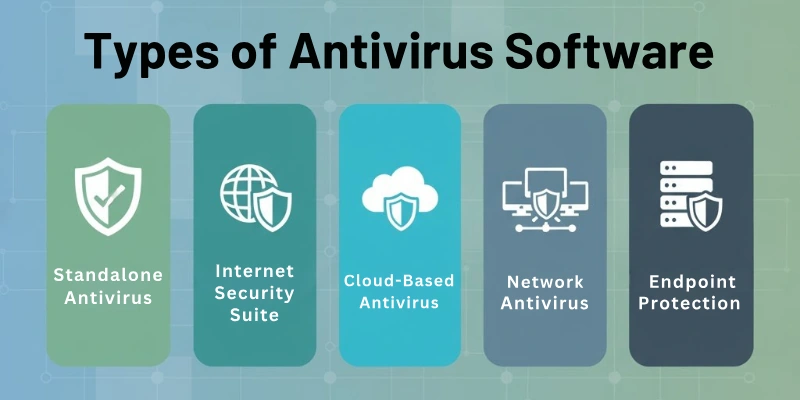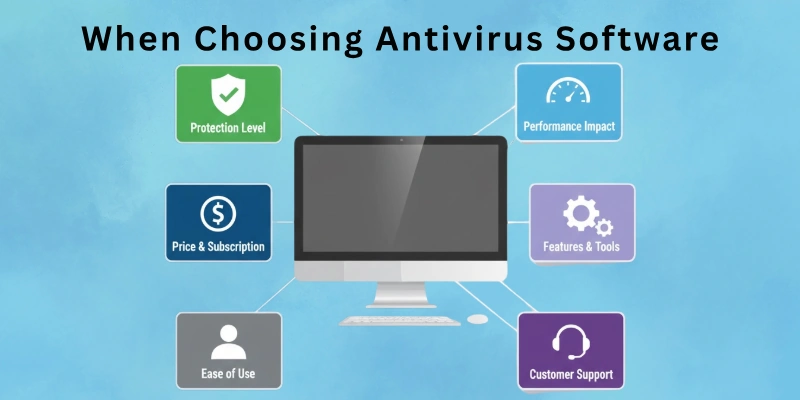10+ Types of Antivirus Programs: Definition, Characteristics & Examples!
Published: 7 Oct 2025
Ever thought about the different types of computer viruses out there? They can really mess up your day, from annoying pop-ups to downright dangerous viruses.
But don’t worry!
There’s something to protect you: antivirus software. In this article, we’ll walk you through the types of antivirus programs you can use to keep your computer safe and sound.
So, guys, without wasting any time, let’s get started!
Types of Antivirus Software
Here is a list of all the major types of antivirus software:

- Standalone Antivirus Software
- Internet Security Suites
- Cloud-based Antivirus Solutions
- Endpoint Protection Platforms
- Mobile Antivirus Applications
- Real-time Antivirus
- On-demand Antivirus
- Heuristic Antivirus
- Spyware Scanners
- Machine Learning Antivirus
- Malware Removers
- Email Antivirus
Let us learn about these antivirus software in detail.
1. Standalone Antivirus Software
A basic program that specifically targets viruses and other malware by scanning your computer for threats.
- Characteristics: Protects against known malware loads, lightweight and resource-friendly.
- Good for: Users who want basic protection and don’t need additional features like firewalls or parental controls.
- Examples: Avast Free Antivirus, Bitdefender Antivirus Free.
2. Internet Security Suites
An all-in-one package that offers antivirus protection alongside additional security features.
- Characteristics: Provides comprehensive protection against viruses, malware, phishing attacks, and often includes firewalls, anti-spam filters, and parental controls.
- Good for: Users who want maximum protection and various security features for their online activities.
- Examples: Norton 360, McAfee Total Protection, ESET Internet Security.
3. Cloud-based Antivirus Solutions
Antivirus software that utilizes cloud-based resources for threat detection and updates.
- Characteristics: Offers real-time protection with access to the latest threat databases, doesn’t require heavy system resources on your device.
- Good for: Users who want lightweight protection and benefit from always-up-to-date threat detection.
- Examples: Bitdefender Antivirus Plus, Trend Micro Internet Security.
4. Endpoint Protection Platforms
A more advanced security solution designed for businesses to manage and protect all devices within their network.
- Characteristics: Provides centralized management of antivirus, application control, device encryption, and other security features for multiple devices.
- Good for: Businesses that need comprehensive protection for all their devices and centralized control for IT management.
- Examples: Crowdstrike Falcon Endpoint Protection, Sophos Intercept X.
5. Mobile Antivirus Applications
Antivirus software specifically designed for smartphones and tablets.
- Characteristics: Protects mobile devices from malware, phishing attacks, and unauthorized access, may also offer features like app scanning and lost device tracking.
- Good for: Users who want to secure their smartphones and tablets from mobile-specific threats.
- Examples: Bitdefender Mobile Security, Kaspersky Mobile Security, Avast Mobile Security.
6. Real-time Antivirus
A type of antivirus that continuously scans your computer for threats in the background, offering constant protection.
- Characteristics: Monitors your system for suspicious activity and blocks threats as they occur.
- Good for: Users who want continuous protection against malware attempting to infect their devices.
- Examples: Most modern antivirus software, including Avast Free Antivirus, Bitdefender Antivirus Plus, Norton 360. (These examples were mentioned previously under other antivirus types, but they all typically include real-time protection).
7. On-demand Antivirus
A type of antivirus that allows you to manually scan your computer for threats at any given time.
- Characteristics: Useful for checking specific files or folders for malware, but doesn’t offer continuous protection.
- Good for: Users who want to run occasional scans alongside a real-time antivirus for extra peace of mind.
- Examples: Windows Defender (built-in to Windows 10 and 11), Malwarebytes Free.
8. Heuristic Antivirus
A type of antivirus that uses advanced algorithms to identify suspicious behavior patterns of unknown malware.
- Characteristics: Can detect new and emerging threats that haven’t been defined in traditional virus databases.
- Good for: Offering additional protection against zero-day attacks (new, unknown malware).
- Examples: Most modern antivirus software incorporates heuristic analysis alongside signature-based detection. Specific examples are difficult to pinpoint as it’s often integrated within the software, but look for features like “behavioral analysis” or “advanced threat detection.
9. Spyware Scanners
Tools specifically designed to detect and remove spyware programs that steal your personal information.
- Characteristics: May be included in some antivirus suites or available as standalone programs.
- Good for: Users who are concerned about spyware threats and want dedicated detection tools.
- Examples: Malwarebytes Anti-Malware, Avast Anti-Track Premium (standalone spyware scanner).
10. Machine Learning Antivirus
A type of antivirus that utilizes machine learning algorithms to continuously learn and adapt to new malware threats.
- Characteristics: Offers advanced threat detection capabilities and constantly improves its effectiveness over time.
- Good for: Users who want cutting-edge protection against constantly evolving malware threats. Machine learning allows this type of antivirus to identify and block even entirely new and unknown malware strains.
- Examples: Bitdefender Antivirus Plus, Trend Micro Internet Security (both advertise using machine learning for advanced threat detection).
11. Malware Removers
Tools specifically designed to remove existing malware infections from your computer.
- Characteristics: Used after an infection has occurred to clean the system and restore functionality. Malware removers often employ different techniques than real-time antivirus to target and eliminate active malware.
- Good for: Users who suspect their computer is already infected with malware and need a dedicated tool to remove it. Not a replacement for real-time antivirus, but a valuable tool to have on hand in case of infection.
- Examples: Malwarebytes Anti-Malware, HitmanPro (standalone malware removal tools).
12. Email Antivirus
A feature within some antivirus software that scans incoming and outgoing emails for malware attachments and malicious links.
- Characteristics: Scans email messages for suspicious attachments, analyzes email content for phishing attempts, destroy suspicious emails or attachments to prevent them from harming your computer.
- Good for: Users who want protection from phishing attacks and malware that can be spread through email. Email remains a common entry point for malware, so email scanning is a crucial defense.
- Examples: Most internet security suites and many standalone antivirus programs include email scanning as a core feature. (Examples like Avast Free Antivirus, Bitdefender Antivirus Plus, Norton 360 were mentioned previously).
Factors to Consider When Choosing Antivirus Software
Here are some key factors to consider when choosing antivirus software:

Protection Level
- Type of threats covered: Does it protect against viruses, malware, ransomware, phishing attacks, and other online threats?
- Real-time protection: Does it continuously scan your computer for threats in the background?
- Detection rate: How effective is it at identifying and blocking known and unknown malware?
System Performance
- Resource usage: Does it slow down your computer’s performance while running scans or in the background?
- Compatibility: Is it compatible with your operating system (Windows, Mac, Android, etc.) and other software you use?
Features
- Additional features: Does it offer extras like firewalls, parental controls, anti-spam filters, or secure browsing tools?
- Ease of use: Is the user interface simple and straightforward? Is it easy to run scans, configure settings, and understand alerts?
Cost
- Free vs. Paid: Free antivirus options exist, but paid versions often offer more features and better protection.
- Subscription options: Consider the subscription cost compared to the features and protection level offered.
Brand Reputation
- Independent testing results: Look for independent testing results from reputable organizations.
- Customer reviews: Read online reviews to get a sense of user experience and satisfaction with the software.
By considering these factors, you can choose an antivirus program that provides the right balance of protection.
Conclusion
In this article, we have covered the 12 major types of antivirus software along with their definitions, characteristics, and examples. Additionally, we have also discussed the factors to consider before selecting any software.
The main point of this article is to emphasize the importance of always having a good antivirus software installed on your system. This software continuously scans your files, emails, and other data to prevent any viruses from harming your system.
FAQs
Here are some of the most commonly asked questions related to types of antivirus software:
Absolutely! The internet is full of threats like viruses, malware, and phishing scams. Antivirus software acts as a shield, constantly protecting your computer from these dangers.
Free antivirus options can offer basic protection, but paid versions often provide more features and better detection rates. They may also include extras like firewalls and parental controls.
Some antivirus programs can use more system resources, potentially slowing down your computer. Look for software known for being lightweight and efficient.
Not necessarily. The best choice depends on your needs. If you’re a casual user, a free antivirus with basic protection might suffice. If you do a lot of online banking or download frequently, a paid option with advanced features might be better.
Don’t panic! Some antivirus programmes include removal tools for existing viruses. You might also try using independent malware cleanup solutions that are specifically built for this purpose.

- Be Respectful
- Stay Relevant
- Stay Positive
- True Feedback
- Encourage Discussion
- Avoid Spamming
- No Fake News
- Don't Copy-Paste
- No Personal Attacks

- Be Respectful
- Stay Relevant
- Stay Positive
- True Feedback
- Encourage Discussion
- Avoid Spamming
- No Fake News
- Don't Copy-Paste
- No Personal Attacks





